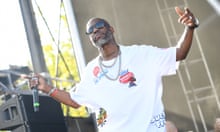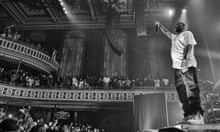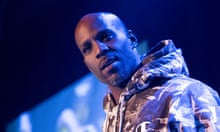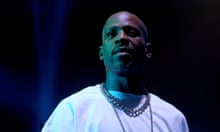Every couple of weeks on Twitter someone posts a video clip of DMX’s performance at Woodstock ’99, usually with a wry caption (“DMX performed for planet earth. Goals”) that references the never-ending crowd, crossing their arms into a sea of Xs.
Dripping with sweat and wearing a pair of beaten up Timberland boots and blood-red dungarees, the New York MC (real name Earl Simmons) growls viscerally before launching into raw hood anthems such as Get at Me Dog and Damien. The crowd of 200,000 mostly white concertgoers shout back combative lyrics such as: “What the fuck you gonna do / When we run up on you?” They sing along to Ruff Ryders Anthem as if it’s an American standard, rather than a song that’s been out only a year.
It’s a surreal scene, especially given how much the star power of DMX, who has had high-profile run-ins with the law and battled substance misuse issues, has waned over recent years. Yet this performance immortalises a moment when he was the hottest rapper on the planet, a liberator who had come to free mainstream rap from its excesses with songs fully immersed in the struggle of being young, poor and black.
Just over a year before, DMX had released his gripping debut It’s Dark and Hell Is Hot to critical acclaim and chart success, shifting US rap into a new direction. Following the murders of 2Pac and Biggie, the mainstream popularity of P Diddy was pushing the genre into what critics describe as the “shiny-suit era”. With the fatalism of gangster rap briefly pushed to the side, hip-hop turned to a lighter, goofier sound, with artists such as Jadakiss, Ma$e, Busta Rhymes and even Jay-Z following Diddy’s lead in wearing leather suits in opulent music videos that were almost exclusively directed by Hype Williams.
For some, these videos showed how far US rappers had strayed from the working-class values their genre was borne out of. This backdrop meant DMX’s blunt, throaty raps, which almost exclusively dealt with the pressures of growing up in a project building in Yonkers, New York or finding twisted new ways to defeat his enemies, felt instantly radical. He addressed the shiny suits head on: “Y’all been eatin’ long enough now, stop being greedy! / Just keep it real, partner, give to the needy!”
DMX quickly followed his impressive debut with the darker Flesh of My Flesh, Blood of My Blood, becoming the first debut artist to release two No 1 albums in the same year. Marilyn Manson was among its guest stars, and it cemented DMX’s superstardom and crossover appeal. “Pop music became a parody of itself in the 80s and then Nirvana came and brought the raw back; DMX was the hip-hop equivalent of Nirvana,” DMX’s producer Dame Grease claimed in a 2018 interview with Okayplayer. “The ‘shiny suits’ era was dope as fuck, but millions of people were craving something more real and X was the only one brave enough to take them there.” Woodstock ’99 was DMX’s lap of honour.
The festival is rightly looked back on as a chaotic disaster. In the 100-degree heat, the overbooked attendees felt as if they were being cooked. Water was expensive and in short supply, and it took over an hour to get from one stage to another. Rioting and violence resulted, with 44 arrests, 1,200 people being sent to the on-site medical facilities, and multiple women being sexually assaulted by a crowd that repeatedly screamed: “Get your tits out.”. With nu-metal bands including Limp Bizkit and Korn, as well as Wyclef Jean doing a naff Jimi Hendrix impression, Woodstock ’99 strayed a long way from the hippie ideals of its 1969 predecessor. The San Francisco Chronicle labelled it “the day the music died”.
DMX mostly rose above it, delivering a performance that cemented street rap’s place on the biggest festival stages. Backed only by a DJ, he rips through his first two records without backing vocals or gimmicks. Amid the abrasive guitars of Fuckin Wit D, his voice sounds capable of moving mountains. Get at Me Dog is even more thrilling – there’s so much bite to his vocals it’s as if teeth are sinking into your ears.

It’s uncomfortable to watch DMX rap bars such as “leave that hoe in plenty of back pain” while topless women in the crowd are fondled by strangers, and to watch thousands of white, Mountain-Dew swilling, nu-metal fans scream back the n-words in his lyrics. But the majority of the show has held up brilliantly. This was a time when rappers who played to white festival crowds were likely to be bottled with urine. The way DMX convulses across the Woodstock stage, in a performance more akin to a Bad Brains gig in a sweaty punk basement, shattered expectations.
His set proved rappers could be rock stars, too, writing the blueprint for the punk rap theatrics of a new generation that included Denzel Curry, Slowthai, Rico Nasty, Bob Vylan, XXXTentacion, Tekashi 6ix9ine and Jpegmafia. Each has cited DMX as a major influence.
One of DMX’s final songs, Slippin, is a slower, introspective church confessional, where the rapper compares his lifestyle to a stray dog, someone “headed nowhere fast.” He forces the hundreds of thousands of suburban white kids in the crowd to consider the hopelessness and inequality in black America. He ends the show with a Kanye-like stream-of-consciousness prayer, and the fact he wasn’t booed is an indication of just how powerful this set was.
DMX, who is working on new music having recently been to rehab, is unlikely ever to match the impact of his late-90s run, but this performance is a reminder of how important his legacy is. Maybe there’s a new DMX waiting in the wings, desperate to free mainstream rap from the perceived excesses of the Drake era. Watching him tear through that Woodstock ’99 stage could just be the inspiration they need.








